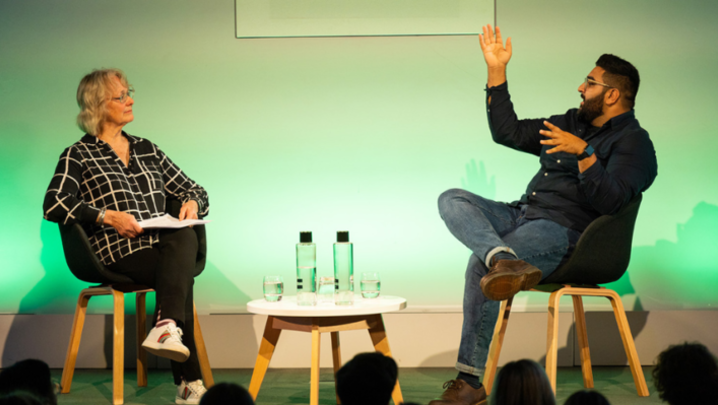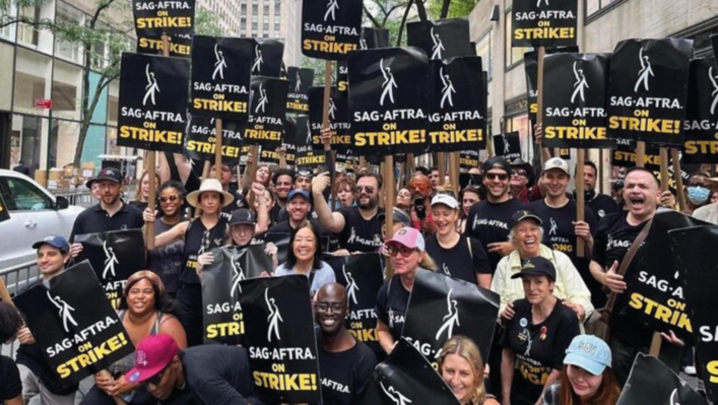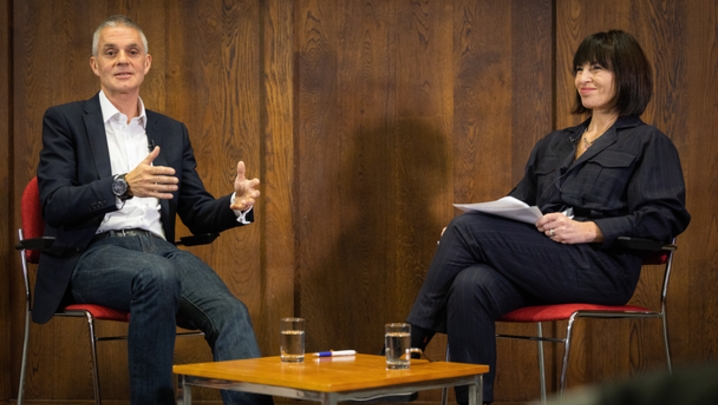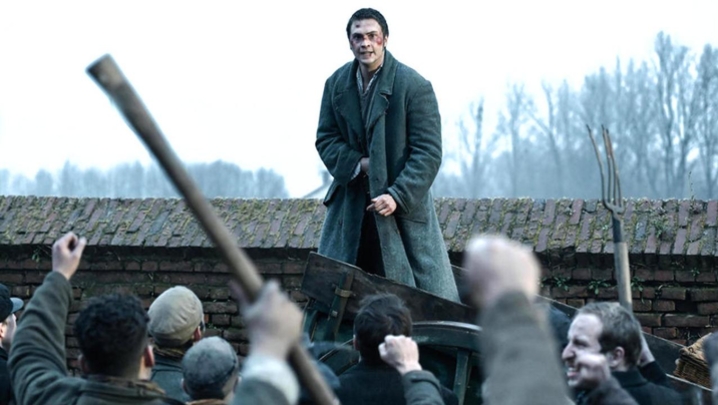A stellar RTS panel presents its predictions for the TV sector in 2024
Last year was a sobering one for television as a post-Covid boom that had seen production and advertising revenues surge fizzled out. Will 2024 see the industry refill its glasses and toast its own success – or is the bubbly still flat?
To answer this question, the RTS assembled a top-notch panel for its first national event of the year; late last month, it asked panel members for their 2024 TV predictions.
Advertising revenues would bounce back during the year, Claire Enders, the founder of Enders Analysis, told a packed house in central London.
She warned, however, that the geopolitical situation – “a seething mass of uncertainty” – was “causing an enormous withdrawal of resources. Every business I know has been cutting costs from 2023 on and I don’t think that’s going to change, because people are so worried about 2025 and the [potential] impact of Donald Trump’s decision-making on geopolitics.”
As bad as the situation may seem here, it is worse in the US – “a shitstorm”, reckoned Evan Shapiro, the media analyst known for his illuminating maps of the media universe.
In contrast with his homeland, Shapiro said, the UK is cocooned by public service broadcasters operating under far less commercial pressure than “the US capitalist content industrial complex”.
Shapiro predicted that Warner Bros, Paramount, Fox and Disney were all at risk of merging or being “consumed” by a big tech company. “At some point, Apple, Microsoft or Google will buy one of our larger programming groups,” he said.
Dan Clays, Chief Executive at EMEA, Omnicom Media Group, was “cautiously optimistic” about advertising rebounding, pointing to “positive economic signals” and “anticipating 3% to 4% growth during this year.
“A lot happened last year, which is setting up broadcasters for a lot of success going into 2024,” said Clays, citing the launch of ITVX and Channel 4’s rebranded VoD platform. “We expect confidence to pick up during the course of the year.”
He added: “You have to remember that 2023 was a tough year for TV, but it was off the back of 2021 and 2022 being the best years ever experienced in advertising in the TV marketplace.”
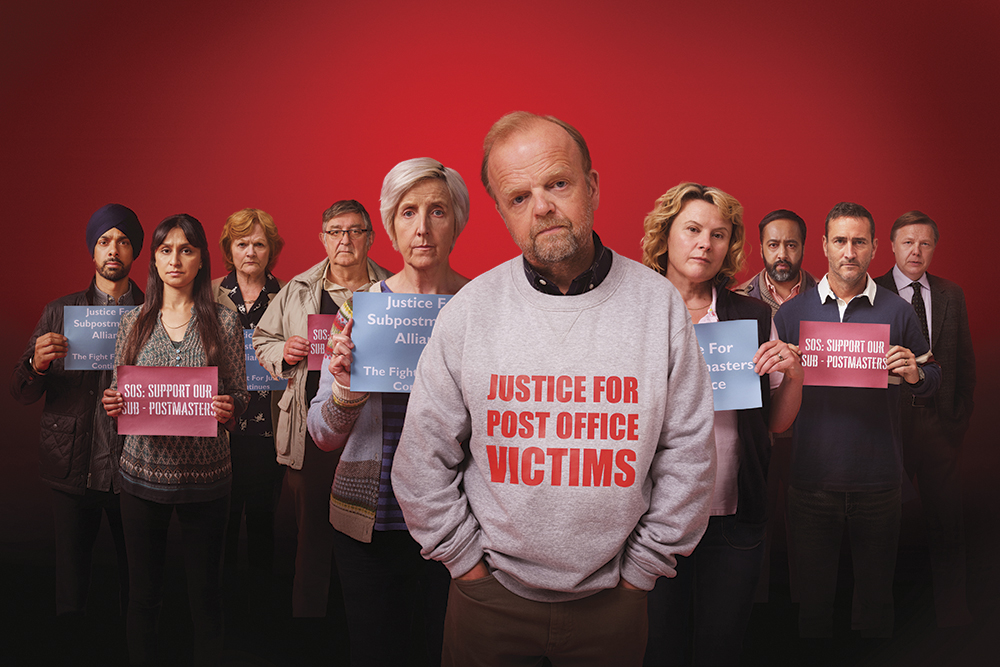
Ash Atalla, CEO of comedy specialists Roughcut Television, currently enjoying success with Channel 4 sitcom Big Boys, endorsed Clays’ cautious optimism. He said: “We can get carried away with the white noise in our industry – the talking and worrying never stops. It’s partly because our industry, at its heart, is unstable. I always say to the staff at Roughcut [that] it’s the tax we pay for having such a stupid, fun job.”
The production chief said that 2024 would see a further increase in “comfort food… old-fashioned stories told in an old-fashioned way. We’ve already seen the Post Office drama [Mr Bates vs the Post Office], a classic David vs Goliath story.
“Look at the massive rebirth of Saturday night television – we’re watching fucking Gladiators again, followed by Michael McIntyre doing his best imitation of a variety show…. [We’re] all‑rushing for the blanket and a hot-water bottle.”
Atalla predicted: “We’re going to see lower-budget shows, telling compelling stories. That’s not a bad thing, because how often do we watch a show and go: ‘Hey, they’ve spent too much money on it… they’ve actually lost the plot.’”
Patrick Holland, UK Executive Chair of the multinational production company Banijay, echoed Atalla’s views about the types of show viewers want to watch: “British stories for British audiences, but not in a Little Englander kind of way”.
However, he believed that scale was becoming increasingly important in the industry, pointing to the success of “big reality shows” such as The Traitors. “The mid-range factual, in particular, that used to fill terrestrial schedules – priced between £150,000 and £250,000 [per hour] – has disappeared.”
Should television be excited or anxious about artificial intelligence? Both, reckoned the panellists at the RTS event. “It is an extraordinary tool… but I really don’t think it’s going to hit into… the creation of stories,” said Enders.
Shapiro added: “It’s very unlikely that a great screenplay is going to be written by a piece of AI, because generative AI does not stay awake at night worrying about the relationship with its father. The imperfections that make us human are what make us able to make art.”
But, he said, there were smaller tasks in television “that would be better handled by AI”, such as improving the discoverability of programmes.
“The days of the scriptwriter are far from over,” said Atalla, who has, in an idle moment, run sitcom and thriller ideas through AI. “From a storytelling and craft point of view, it’s a long way off being able to beat what the best of us do.”
Report by Matthew Bell. The RTS National Event ‘2024 TV predictions: an expert view on the year ahead’, was held in central London on 30 January. It was hosted by Katie Prescott of The Times, and produced by Julie McKeen and David Amodio.
Question & answer
Is there room for real originality in such a risk-adverse business as television?
Claire Enders: Our creativity is endless… there will be a constant stream of talent.
Patrick Holland: The excitement that you have when you see an original idea makes you [go]: ‘I’m going to make this show’…. We’re all in this industry to do something new.
Is sustainability becoming a luxury?
Ash Atalla: Broadcasters are not working with us unless we adhere to certain things on set…. We used to get asked nicely and it was: ‘If you can, that would be good.’
Now… broadcasters are saying: ‘We won’t work with you unless you do X, Y and Z.’ It’s a strong-arm tactic and it makes absolute sense to me.
Last year was a bad year for freelancers in TV. Will this year be any better?
Ash Atalla: I feel for freelancers; we sense it when people come into see us for jobs… I can see people are hurting…. The truth is, I don’t think there are more shows going to be made this year; I think [there will] be fewer.
Claire Enders: Movie-making is booming so, if you can get yourself into movies, I’d be making that shift now and staying there.
Patrick Holland: If you’re not getting jobs in a particular genre, look at reskilling or [at] different parts of the industry.
Evan Shapiro: If you follow the money, there’s a lot going to sport.
Is the decline in linear TV flattening out?
Claire Enders: The linear decline is a systemic change in the market – it’s going to keep going. But we do have 67 million people here, and those of us over 45 have an awful lot of money and we’re living very long lives.… So, we are not at the end of the digital transition.
Patrick Holland: Think about the power of live [TV] in terms of Eurovision, the King’s coronation and the scale of those audiences, then you think about sport this summer [Euro football and Olympics] and the election and… Love Island… the convening power of television is still such an extraordinary thing.
Evan Shapiro: Linear will survive for people who like to have stuff curated and for sport and news.


